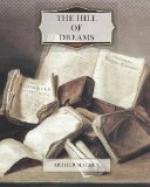morning feeling weary and listless and heavy-headed.
While he dressed, his legs dragged him as with weights,
and he staggered and nearly fell in bending down to
the mat outside for his tea-tray. He lit the spirit
lamp on the hearth with shaking, unsteady hands, and
could scarcely pour out the tea when it was ready.
A delicate cup of tea was one of his few luxuries;
he was fond of the strange flavor of the green leaf,
and this morning he drank the straw-colored liquid
eagerly, hoping it would disperse the cloud of languor.
He tried his best to coerce himself into the sense
of vigor and enjoyment with which he usually began
the day, walking briskly up and down and arranging
his papers in order. But he could not free himself
from depression; even as he opened the dear bureau
a wave of melancholy came upon him, and he began to
ask himself whether he were not pursuing a vain dream,
searching for treasures that had no existence.
He drew out his cousin’s letter and read it
again, sadly enough. After all there was a good
deal of truth in what she said; he had “overrated”
his powers, he had no friends, no real education.
He began to count up the months since he had come
to London; he had received his two thousand pounds
in March, and in May he had said good-bye to the woods
and to the dear and friendly paths. May, June,
July, August, September, October, November, and half
of December had gone by; and what had he to show?
Nothing but the experiment, the attempt, futile scribblings
which had no end nor shining purpose. There was
nothing in his desk that he could produce as evidence
of his capacity, no fragment even of accomplishment.
It was a thought of intense bitterness, but it seemed
as if the barbarians were in the right—a
place in a house of business would have been more
suitable. He leaned his head on his desk overwhelmed
with the severity of his own judgment. He tried
to comfort himself again by the thought of all the
hours of happy enthusiasm he had spent amongst his
papers, working for a great idea with infinite patience.
He recalled to mind something that he had always tried
to keep in the background of his hopes, the foundation-stone
of his life, which he had hidden out of sight.
Deep in his heart was the hope that he might one day
write a valiant book; he scarcely dared to entertain
the aspiration, he felt his incapacity too deeply,
but yet this longing was the foundation of all his
painful and patient effort. This he had proposed
in secret to himself, that if he labored without ceasing,
without tiring, he might produce something which would
at all events be art, which would stand wholly apart
from the objects shaped like books, printed with printers’
ink, and called by the name of books that he had read.
Giotto, he knew, was a painter, and the man who imitated
walnut-wood on the deal doors opposite was a painter,
and he had wished to be a very humble pupil in the
class of the former. It was better, he thought,
to fail in attempting exquisite things than to succeed




